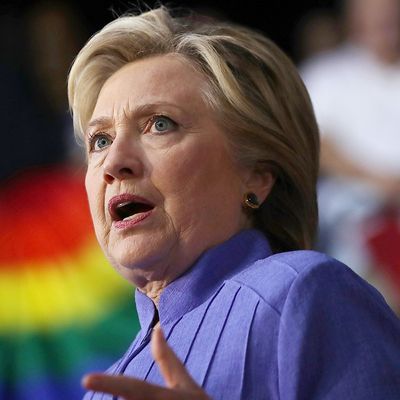
Toward the end of summer, after Donald Trump held a dumpster fire of a convention — with speeches by a random avocado farmer and Scott Baio, culminating in Ted Cruz refusing to endorse the nominee as the crowd booed furiously — followed by Hillary Clinton’s well-managed one, with unifying speeches by the popular president and First Lady, the presidential campaign seemed to be over. And then something happened, something that was not fully understood or believed at the time. Trump nearly caught Clinton in the polls.
The best explanation for the tightening of the race was that questions about Clinton’s ethics dominated the news environment for a brief period. We don’t know yet if James Comey’s surprise Friday announcement will reshape the race in a similar fashion. But it is entirely plausible to believe that it will. He has revived Clinton’s ethics and alleged illegality as the front-and-center question before the voters in the race’s final week. To assume Comey’s statement will have no effect, as many hopeful Clinton supporters do, is to assume the voters will respond in a way they have not responded before.
Comey’s announcement is a shocking breach of a vital, decades-old law-enforcement norm prohibiting the announcement of charges against candidates in the closing stages of the race. Staffers at the Department of Justice tried to steer Comey away from his announcement. His decision has baffled and outraged law-enforcement veterans in both parties, like Democratic former attorney general Eric Holder, Democratic and Republican former deputy-attorney generals Jamie Gorelick and Larry Thompson, and Republican former chief White House ethics lawyer Richard Painter. The logic behind the norm is very simple: Law enforcement has extraordinary leverage over public opinion, and charges, or reports of potential charges, can be tantamount to proof of guilt in the public eye — even if guilt is not proven, and even if no charges are ultimately filed.
Indeed, it is a virtual certainty charges will not be filed. NPR’s Carrie Johnson reports that only some extraordinary new information would upend Comey’s decision from earlier this summer not to prosecute. Many Republicans are salivating at the possibility that the FBI will pry open the criminal conspiracy they are morally certain existed all along, but the emails have never revealed anything worse than Veep-like figures muddling through bad choices driven by a combination of technological ineptitude and paralyzing fear of the media. It is bad but not remotely criminal; let alone comparable to the alternative, which is an unhinged man-child promising to revive torture and imprison his opponents.
Importantly, Comey has withheld any comment at all on links between Trump’s campaign and Russian cyberattacks designed to subvert the presidential election. When Representative Jerry Nadler presented Comey earlier this year with questions about Trump adviser Roger Stone, who has boasted of his “back-channel communication” with Julian Assange, Comey very properly refused to confirm whether any investigation was under way.
By contrast, he has litigated the charges against Clinton through the media.
It is vanishingly unlikely that Comey had any intent to sway the electorate. It is possible to understand his decision as the product of excruciating pressures. Some FBI agents have been reportedly champing at the bit to investigate the Clinton Foundation; and Republicans from Trump to Paul Ryan have spent months lambasting the FBI director for his failure to lock her up. He may have found himself trapped by his earlier announcement of his decision not to prosecute, which perhaps allowed him to believe that he would merely be acting with consistency by declaring the investigation would continue. But Comey’s decision to follow his own precedent smashed the much more important and longstanding precedent that is supposed to bind him.
Perhaps Comey believed that a properly measured statement would have a political impact proportional to its scale. That belief was delusional. If there is any circumstance for which the precedent against late charges should apply, it is to the current race. Hillary Clinton is a morally imperfect figure, surrounded by shady figures and burdened with poor political instincts, but she is a normal public servant and no crook. The lack of proportionality applied to her real but minimal ethics failures is staggering. The email issue has completely dominated the news media’s coverage of her campaign, blotting out any attention to policy issues. Low-information voters — that is, the most persuadable undecided ones in the middle — know her primarily as the subject of ethical and legal suspicion. It is why media coverage of her pneumonia and her campaign’s failure to disclose it coincided with her lead collapsing into a near-tie. A voter following the campaign through cable news and headline snippets would rationally conclude that Trump’s lunatic portrayal of his opponent as a criminal is not far from the truth.
Comey’s announcement will probably not sway enough voters to make Trump president. But it might, and — given the stakes — that “might” ought to be a terrifying and galvanizing prospect.






























